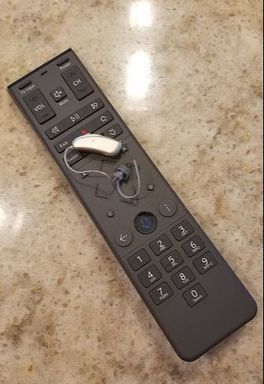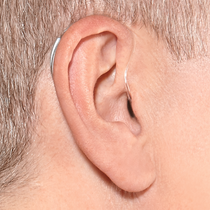|
A note from Ruth: Last month, I wrote about how hearing loss impacts our health as we age and in turn, our quality of life in retirement. As a follow-up, I asked my brother John to contribute some thoughts on hearing loss and correction, since he deals with it on a daily basis. He is a highly respected Doctor of Audiology and is passionate about helping people remain connected through better hearing. He is contributing this guest blog in order to provide additional perspective on getting help, whether you or a loved one or a friend are impacted by hearing loss. Contributed by Dr. John Tongen After nearly 40 years as an audiologist, I’ve come to understand that hearing loss is a sensitive topic to many people. Time and again, I’ve observed emotions ranging anywhere from deep sadness to outright indignation at its mere mention. With that in mind, perhaps I can best contribute to this audience by sharing some insight I've gained, not only during my years as an audiologist, but from being a hearing aid user, myself.  The Hurdles Let’s be honest. No one is jumping up and down with joy at the prospect of getting hearing aids. It is simply a matter of fact that hearing aids don’t curry favor with people; chiefly, I believe, for two reasons: First, as is true with many systems within our body, our ability to hear and process information can diminish quite rapidly as we get older. For some reason, however, as soon as we associate anything with aging, most of us seem to be pretty good at putting off doing anything about it. In fact, it is well documented that people wait an average of 7-10 years from the time they first become aware of a hearing problem before actually addressing it. Second, the price for a quality set of hearing aids will generally fall somewhere between $4000 and $6000. That’s a big investment, to be sure! With that in mind, I’ve attempted to help patients address the cost factor by giving some perspective to those numbers. I tell patients that my cable TV bill is about $100 a month. In one year's time, that totals $1200. After 5 years, I will have spent $6000. For your information, I watch no more than 60-90 minutes of TV a day. From a comparison standpoint, the price of my hearing aids is also about $6000. I wear them 12 hours a day. They allow me to be fully functional at work. They allow me to socialize with friends and family. They keep me connected to the people in my world. They save me from frequent embarrassment in conversations. And they allow me to hear my granddaughter say “I love you, Papa.” All that, for the same price as cable TV. As important, or perhaps an even more important consideration, is that the lack of cognitive stimulation that accompanies even a mild hearing loss is associated with cognitive decline and dementia. Reports from Johns Hopkins Medical Center (and others) indicate that a mild hearing loss can increase the risk of developing dementia by 200% and up to 500% for those with a severe hearing loss. On top of that, the risk of falling increases 140% with every additional degree of unmanaged hearing loss. With that said, if I can increase my enjoyment of conversation with friends and family, reduce my social embarrassment as well as the frustration of those wishing to visit with me all while substantially reducing my risk of falling and dementia for the same price as cable TV, I don't see that there's much to debate. In fact, I don't think of it in terms of "I have to" wear hearing aids. When I see all they do for me, my thinking is, "Thank goodness I can wear hearing aids". I may not like having to wear hearing aids, but I sure like all the amazing things they do for my quality of life. Fascinating Hearing Aid Technology So what else will hearing aids do for you? As I go about my day, my hearing aids constantly survey the sounds around me at the rate of 700 times per second. As a result, based on whatever new and changing sound-envelope I find myself in, my hearing aids immediately note the auditory shift. In response, the instruments instantly reprogram thousands of technical parameters to optimize my ability to hear the speech signal at any given moment. My hearing aids sense when I’m in quiet; they sense when I’m in noise. They sense the direction from which the noise is coming and instantly reduce it. Outside, they deactivate the microphone most exposed to the wind and replace that microphone’s input with an instant transmission from the microphone of the other hearing aid. They also sense when I am in the car and automatically reduce road and car noise. In addition, my hearing aids receive a signal directly from my telephone so I don’t even have to take my phone out of my pocket to answer it. They also receive a signal from my TV so I can listen at the volume I want without disturbing others. The technology truly is amazing. These are not your grandfather’s hearing aids!  Fitting and Problem-Solving Make all the Difference As regards where to buy hearing aids, the very best hearing aid in the world has little utility if it is not fit properly. In all candor, there are many hearing aids lying unused in desk drawers, not because there’s anything wrong with the hearing aids but rather because the person from whom they were purchased may have only received effective training in the sales aspect of the hearing aid business. Keep in mind that saving money up front makes them less of a bargain if they end up sitting in the drawer or aren’t right for you. There are many places to buy hearing aids. They can be purchased online, from department stores, from licensed hearing instrument dealers and from Doctors of Audiology. Each of those sales points can result in a successful or unsuccessful fitting. A Doctor of Audiology has, by far, the most extensive training in dealing with hearing loss. It is my opinion that a Doctor of Audiology will likely provide the most thorough and effective diagnostics and services for your hearing loss. Look for the credentials "Au. D." or "Doctor of Audiology" when shopping for someone to fit you with hearing aids. If you didn't find the right person the first time, try again to find someone who will listen and problem solve with you. Sooner is Better than Later Finally, if you take only one piece of information from my writing, please take this one: Act now! I can assure you that the longer you live with hearing loss, the more difficult it is to help you. People who address their hearing loss early are, far and away, the most successful users of hearing aids. Those who wait until they are severely hearing impaired most frequently have a very difficult time adjusting back into the world of normal sound. Also, even though hearing aid technology is very user friendly, we all know the older we get the more difficult it becomes to learn new technology, even if it means just turning something on or off. With regard to aging, I don’t know about you, but my fingers don’t seem to cooperate the way they used to. As such, when it comes to handling and manipulating today’s miniature hearing aids, I’m really glad I mastered the process before my fingers went on strike. John Tongen, Au. D.
References:
Feel free to comment about your own experiences with either experiencing hearing loss or living with someone with hearing loss. What have you tried with success? What have you struggled with? What other information needs to be out there?
3 Comments
9/5/2018 01:05:25 am
Love this article. I started wearing hearing aids in my early 60’s and it is the best thing I could do for my life and my relationships. It is amazing how stressful it is when you can’t hear and try to pretend you can. Not worth it!
Reply
Maxine
9/5/2018 11:44:17 am
This was very helpful. I had my hearing tested a few years ago by the Dr of audiology that Dr John recommended in Fargo. At that time I had slight loss but not enough to warrant hearing aids. I might need them now
Reply
Leave a Reply. |
AuthorRuth Tongen helps people plan and live meaningful, fun and healthier retirements. Archives
January 2022
Categories
All
|
|
Ruth Tongen 952-223-1121 [email protected] www.ruthtongen.com Copyright © ruthtongen.com. All Rights Reserved. |
Questions or to
Schedule a Free Consultation Sign up to receive Meanderings:
The New Retirement via email x
Receive a copy of Meanderings: New Ideas for Retirement in your email.
|



 RSS Feed
RSS Feed
